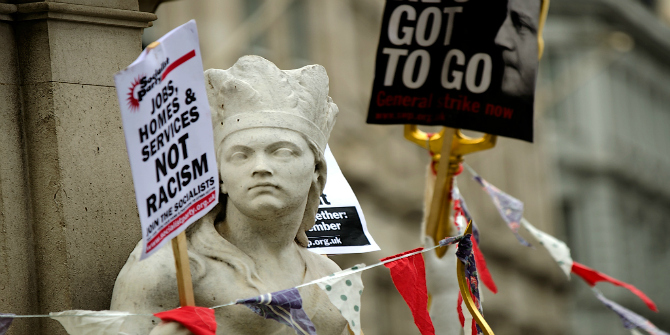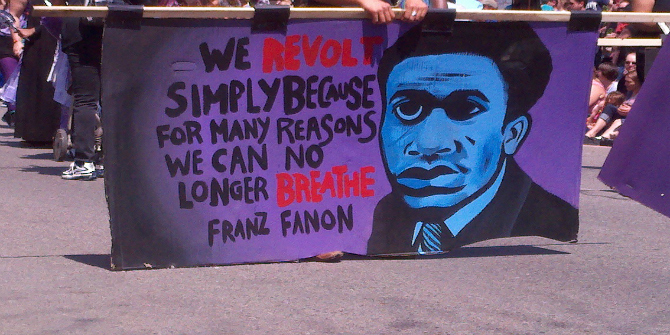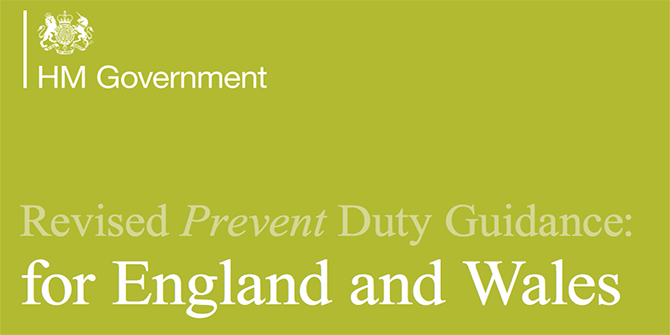 Political parties are in decline, with membership and party identification both falling. How can they remain relevant in the 21st Century when the foundation on which they rest are disintegrating? Jess Garland argues that there is hope for parties in the modern world, but only if they adapt.
Political parties are in decline, with membership and party identification both falling. How can they remain relevant in the 21st Century when the foundation on which they rest are disintegrating? Jess Garland argues that there is hope for parties in the modern world, but only if they adapt.
Commentators have been writing the political party’s obituary for decades. Ailing parties – broke, unpopular and haemorrhaging members – looked for many years, next to their younger and more fashionable single-issue and social movement challengers, to be on the way to the political scrapheap. Once upon a time, parties had held a place so central to political life that democracy was, in Schattschneider’s term, ‘unthinkable’ without them. Now, there are more people who identify their religion as ‘Jedi’ than there are members of the Conservative party, and almost the same number of Labour members.
But whilst memberships have plummeted and the traditional social links between citizens and political parties have withered, a new party model has been emerging. The mass party might have passed away, but a new, more open and flexible party is taking its place, one that matches citizens’ political behaviours in the 21st century. A new report by the Electoral Reform Society argues that the future for parties can be secured by reaching out beyond traditional memberships, thinking differently about how they relate to other parties and shifting the culture of politics.
But parties also need to face up to some difficult truths about their future. Politics as usual will not suffice. A specially commissioned poll for the ERS by ComRes, surveying the 40 most marginal Conservative-Labour constituencies, finds significant support for multi-party politics. Some 67% believe the rise of smaller parties such as UKIP and the Greens is good for democracy against just 16% who think the opposite. And 51% believe it is better to have several smaller parties than two big parties against 27% who think the opposite.
Even in these marginal seats where two-party competition is at its most antagonistic, respondents were comfortable with the more collaborative and consensus-building politics common to multi-party politics. Some 78% believe the Opposition should work with the government on issues they agree on, and 54% believe Parliament works best when no party is too dominant so that cross-party agreement is needed to pass laws.
Whilst the public is repeatedly subjected to the embarrassing display of partisan posturing that goes under the name of Prime Minister’s Questions, it is clear that a more nuanced and grown-up understanding of the way politics happens chimes with citizens’ preferences. If parties respond to this shift by modernising and changing their structures and cultures, they could not only survive but prosper.
The traditional structures of political parties are more suited to a time when people would go to a local party meeting because that was one of the few social activities available. It should be no great surprise that in an era offering an almost limitless number of avenues for of political expression (from online petition-signing to offline direct action), formally joining an organisation and attending a chaired meeting in a constituency office or town hall doesn’t hold great appeal. Citizens have a different relationship with politics and a different way of doing politics. Parties, which were once organisations that facilitated mass participation in politics by educating and mobilising voters, now compete for support in a complex and contested political marketplace.
Yet, despite being largely unpopular and mistrusted, political parties continue to perform essential roles in government, in the legislature and electorate. These are roles that are recognised and valued. The tripling of SNP membership in the weeks following the Scottish independence referendum suggests that whilst people value being given a direct democratic voice, the political party is still seen as a meaningful way of getting involved politically. Parties can no longer rely on a fixed, socially structured, partisan following, but that doesn’t mean they cannot amass support.
Whilst party membership is not as attractive to citizens as it once was, there are many other ways of connecting to citizens and engaging them in party activity. As the ERS report details, parties have already experimented with opening up to ‘supporters’ or ‘friends’. Many people do want to get involved in party politics but don’t see life membership as the way of doing so. In some cases parties are expanding rights which were formerly the preserve of members. The introduction of primaries and more open policy-making processes are beginning to bring a wider group of citizens into party activity. The future challenge for parties is to match a more open relationship with non-members with the structures that traditionally facilitated party membership rights.
Parties have shown enormous resiliency, and have adapted to survive. But they remain unpopular, and in some cases increasingly so. This report suggests some ways in which parties can continue to adapt so that they find a sustainable footing in the 21st century.
Note: This article was originally published on the Democratic Audit blog and gives the views of the author, and not the position of the British Politics and Policy blog, nor of the London School of Economics. Please read our comments policy before posting. Featured image credit: Peter Birkinshaw CC BY 2.0
 Jess Garland is Policy and Research Officer at the Electoral Reform Society. A former Senior Political Adviser, she has spent six years working in Parliament for Shadow Ministers and MPs. Jess is responsible for policy and research development for the Society. She has a Research Masters in Government, Policy and Politics and was formerly Chair of a youth-led volunteering charity.
Jess Garland is Policy and Research Officer at the Electoral Reform Society. A former Senior Political Adviser, she has spent six years working in Parliament for Shadow Ministers and MPs. Jess is responsible for policy and research development for the Society. She has a Research Masters in Government, Policy and Politics and was formerly Chair of a youth-led volunteering charity.








Why should one vote cast in a General Election count more than any other? It is not who casts it, or where it is cast – each vote should be treated equally, and all votes should make a difference to the overall result.
I mentioned PR but I don’t favour List PR. I agree with you that the constituency system should be retained. I favour a PR system similar to AMS (used in Scotland) but with all MPs elected in single member constituencies (so no boundary changes would be necessary.)
More people live in London than the whole of Scotland so by your logic Scotland can be outvoted by one city in England. does this seem fair? One third of the UK land area would be outvoted by one city? If you use proportional representation then MPs do not have a constituency and with no constituents they have little responsibility.
It will be difficult to get parties to change unless we change the electoral system. Political parties and how they conduct themselves are necessarily shaped by the voting system. The public may be disillusioned with political parties and how they behave, but the root cause is the electoral system. The coming election may well focus attention on the dysfunctional way we count the votes.
The 2015 UK Parliamentary Election Forecast website shows that in May the SNP could have 32 seats with 3.1% of the vote, while UKIP could have 3 seats from 11.2% of the votes. How can this be acceptable?
While Labour and Conservative may be neck and neck, but with less than 33% of the vote, Labour may have more seats but less votes than the Conservatives!
If FPTP disenfranchises many voters, the conflation of the vote for the party with the vote for the candidate further emasculates them. If we take an interest in politics and have strong views about the parties and their policies how do you elect the best MP and the best party of government when the best candidate is not from your preferred party?
Local campaigns are the opportunity for people to engage, get involved. People need to see, meet, hear, know, the candidates so retention of the smallest constituency unit, the single member constituency, should be fundamental to voting reform. Multi-member constituencies are a recipe for losing touch with the electorate.
Come on, ERS. STV is a drag on reform. It’s time to consider other voting systems!
There seems to continually be motivation about the lack of confidence and trust the public have politicians and political parties, but a failure to engage in a discussion and debate about the Political SYSTEM itself – which is responsible for ‘failing’ the public in a diversity of ways.
The fact is, while politicians continue to claim that they are Harnessing the Voices of ‘ordinary’ folk, in reality MPs still have No Legal or Statutory Obligation to Represent anybody… and often they don’t – in a way that is considered ‘reasonably’ Fair or Just in order to achieve Redress due to political policy failings in the lives of constituents. Thus, how long do we carry on not having the type of conversation that in inevitably at the core of WHY and HOW politicians remain untrusted?
Finally, just as an example to the above, I remember reading about a elderly war veteran who took an MP to Court stating that “she was lazy”. The Judge couldn’t rule against the MP – as he said “their is NO legal or statutory agreement between constituents/public and politicians. Thus, at some stage someone has to explain the following:
1. WHY an MP continues to have NO Job Description to identify their role and OBLIGATION to constituents
2. WHY we continue to pay them £67,000.00 a year for the privilege.
PS: None of the above is actually representative of any Democracy worthy to be enforced at the public. So, why on earth do we tolerate such Weaknesses that clearly is indicative of the lack of improvement to our lives, a WEAK benchmark towards Fairness and Justice for ALL – something we ALL SHOULD expect to achieve as a result of WRONGDOING?
Meanwhile the Green Party has increased their membership and the SNP have over 100,000 members making them the third largest Political Party in the whole of the UK. Most of the increase since the Scottish referendum on independence last September. Maybe they are engaging with the Electoral and offering something different from the dinosaurs in Westminster?